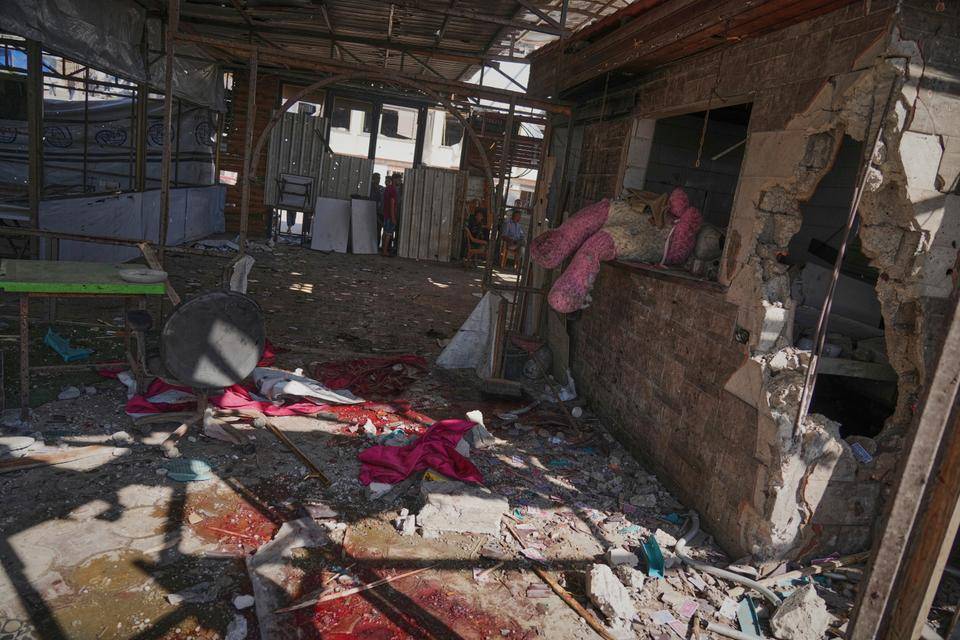Chaos and Tragedy as Gaza Café Reduced to Rubble in Overnight Airstrike
Gaza City, July 1, 2025 — In the early hours of Sunday morning, a popular café in Gaza City became the scene of unspeakable horror after an Israeli airstrike struck the area, killing at least 23 people and injuring dozens more. The café, known locally as a place where families and friends gathered to find brief respite from the ongoing conflict, was flattened in seconds, leaving behind shattered glass, twisted metal, and grieving families.
Witnesses described a deafening explosion followed by screams and chaos as the building crumbled into dust. Emergency responders, overwhelmed and visibly shaken, worked through the night, pulling bodies from the wreckage and treating survivors under streetlights and flashlights due to widespread power outages.
“It was a normal evening,” said Mahmoud Saleh, a local resident who had been sitting two blocks away when the missile struck. “People were watching the football match, drinking tea. It was peaceful—until it wasn’t. One second you’re hearing laughter, and the next, everything goes black.”
The Israeli military confirmed the airstrike early Sunday but claimed the target was a Hamas command center operating from within the urban area. In a brief statement, the Israeli Defense Forces (IDF) said, “Our forces struck a strategic militant site being used for operational planning. We regret any civilian casualties and are reviewing the incident.”
However, local officials and residents fiercely dispute the military's claim. “There was no militant base there,” said Dr. Hanan Abu Issa, director of the nearby Al-Shifa Hospital. “It was a café. Young people were playing cards and drinking coffee. Children were outside. This is not a battlefield; it's a community.”
Security analysts acknowledge the challenge of identifying military targets in densely populated urban areas like Gaza. Yet human rights observers argue that the increasing civilian death toll raises urgent legal and ethical concerns.
Gaza has been the focus of intense military activity in recent weeks following a sharp escalation in hostilities between Israel and armed Palestinian factions. The latest round of violence has left over 500 Palestinians dead, many of them civilians, and thousands injured. Israeli casualties, though far fewer, have also included both soldiers and civilians due to cross-border rocket attacks.
As the bombing campaign continues, Gaza’s infrastructure has crumbled under the weight of destruction. Hospitals are operating beyond capacity. Electricity is available only intermittently. Food and clean water are becoming harder to access by the day.
The café that was hit, named Al-Waha, had become a symbol of everyday resistance—a place where people tried to maintain a semblance of normal life despite the constant threat of violence. “It was a refuge,” said 27-year-old Rawan Khaled, who lost her cousin in the blast. “We knew it wasn’t safe anywhere, but at least there, we could pretend for a little while.”
Several survivors shared harrowing stories of the moments immediately following the explosion. “I was washing cups when I heard a loud whistle and then everything went white,” said Sami Joudeh, a 34-year-old waiter at the café who suffered burns on his hands and arms. “I woke up under a table. My friend Nabil was next to me. He wasn’t moving.”
Nearby, a mother of two, Lina Youssef, arrived minutes after the bombing, searching for her teenage sons who had gone out for dessert. “They weren’t answering their phones,” she said, her voice cracking. “I found Ahmed first—alive, thank God—but injured. His brother… I found his shoes.”
Many of the bodies recovered from the site were burned beyond recognition. Hospitals have made urgent appeals for medical supplies, body bags, and forensic equipment to help identify the deceased.
News of the café bombing quickly spread beyond Gaza, drawing condemnation and concern from humanitarian organizations and foreign governments. The United Nations Office for the Coordination of Humanitarian Affairs (OCHA) issued a statement calling for an immediate investigation, stating that “the targeting of civilian infrastructure, if verified, constitutes a grave violation of international law.”
France, Turkey, and South Africa also released statements expressing concern over the increasing civilian toll. “The violence must stop,” said French Foreign Minister Élise Dufour. “There can be no military solution to this conflict—only more suffering.”
In Washington, the White House issued a cautious statement, reiterating Israel’s right to self-defense but urging “maximum restraint and protection of civilian lives.” Calls for a ceasefire have grown louder in diplomatic circles, but no breakthrough appears imminent.
For many young Gazans, the strike on Al-Waha Café is yet another traumatic chapter in a life shaped by war. Schools are closed. Universities have become shelters. Job opportunities are scarce. And now, even the simplest joys—a coffee with friends, a football match on a summer night—are no longer safe.
“I don’t know what future we’re supposed to build from this,” said Amr Zidan, a university student who frequented the café. “We bury our friends, we clean up the blood, and then we wait for the next missile.”
Psychologists warn of a mental health crisis unfolding in Gaza, where children show signs of PTSD, depression, and chronic anxiety at alarming rates. “There’s no time to process trauma here,” said Dr. Reem Nassar, a clinical psychologist working with displaced families. “Because the trauma never end.
Despite international pressure, both sides show little sign of backing down. Israeli officials argue that Hamas and other militant groups have embedded themselves within civilian areas, making targeted strikes necessary. Palestinian leaders, in turn, accuse Israel of collective punishment and disproportionate force.
For now, the people of Gaza are left to pick up the pieces once again. As bulldozers clear the rubble of what was once a neighborhood hub, families search for loved ones—some finding only fragments.
In the words of café worker Sami Joudeh, “We’re not soldiers. We serve coffee. We clean tables. We try to live. Why is that a crime?”



